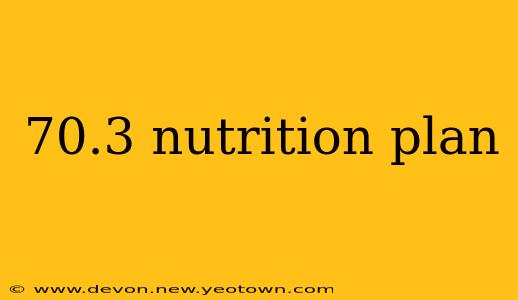The anticipation builds. Your training is peak, your gear is packed, and the starting line of your 70.3 Ironman looms. But before you even think about conquering that swim, bike, and run, you need a rock-solid nutrition plan. This isn't just about eating; it's about fueling your body for peak performance and recovery. This plan focuses on the weeks leading up to race day, ensuring you're prepared to give your absolute best.
What to Eat the Week Before a 70.3
The week leading up to race day is crucial. This isn’t the time to experiment with new foods or drastically change your diet. Instead, focus on consistency and ensuring you have enough energy stores. Think of it as fine-tuning your engine for the race.
Prioritize Carbohydrates: You need carbohydrates to fuel your muscles. Increase your carbohydrate intake gradually throughout the week, focusing on complex carbohydrates like whole grains, brown rice, sweet potatoes, and quinoa. Avoid simple sugars that lead to energy crashes.
Maintain Protein Intake: Protein is essential for muscle repair and recovery. Continue with your regular protein intake from lean sources like chicken, fish, beans, and lentils.
Hydration is Key: Dehydration significantly impacts performance. Start increasing your water intake several days before the race. Consider electrolyte drinks to replace salts lost through sweat.
Sample Meal Plan (Adjust based on your individual needs and calorie requirements):
- Monday-Wednesday: Balanced meals with a moderate increase in carbohydrates.
- Thursday: Slightly higher carbohydrate intake. Focus on easily digestible foods.
- Friday: Similar to Thursday.
- Saturday (Pre-Race Day): High-carbohydrate, low-fiber meal.
What to Eat on Race Day
Race day nutrition is all about timing and easily digestible fuels. Your goal is to maintain energy levels without causing digestive upset.
Pre-Race: A light, easily digestible breakfast 2-3 hours before the race start. Think toast with a little banana, oatmeal, or a small energy bar. Avoid anything high in fiber or fat.
During the Race: This will vary based on the race length and your individual needs, but you'll need to regularly refuel during the bike and run portions. This could include energy gels, chews, sports drinks, or even real food like bananas or small pieces of dried fruit. Experiment with different options during your training to find what works best for your body.
Post-Race: Replenish glycogen stores and repair muscles by consuming a balanced meal or snack immediately after the race. Focus on carbohydrates and protein. A protein shake with fruit and some carbohydrate source is a great option.
How Many Calories Should I Consume?
This is highly individual and depends on your training volume, metabolism, and body weight. Generally, athletes training for a 70.3 Ironman will need a higher calorie intake than someone not training intensely. Consult with a registered dietitian or sports nutritionist to determine your specific calorie needs. They can help you create a personalized nutrition plan that supports your training and race performance.
What Should I Avoid Before a 70.3?
- High-fiber foods: These can cause digestive upset during the race.
- Fatty foods: These take longer to digest and can lead to stomach cramps.
- Spicy foods: These can also upset your stomach.
- New foods or supplements: Don't try anything new close to race day.
- Alcohol: Dehydrates you and disrupts sleep.
What Should I Eat During the 70.3 Race?
During a 70.3, consistent fueling is crucial. Your strategy needs to cover the swim, bike, and run. Experiment with different fuel sources in training.
- Swim: Usually doesn't require specific fueling, but hydration is key.
- Bike: Energy gels, chews, sports drinks, or real food like bananas or energy bars.
- Run: Similar to the bike, but maybe smaller portions due to less time and higher intensity.
How Much Water Should I Drink?
Hydration is vital! Start hydrating days before the race. During the race, drink regularly, even if you don't feel thirsty. Pay close attention to your sweat rate during training to determine your hydration needs during the race.
By following a well-planned nutrition strategy, you'll be well-prepared to tackle your 70.3 Ironman with the energy and strength you need to succeed. Remember, consistency and personalized planning are your best allies in reaching your goals. Remember to consult with professionals for tailored advice.

